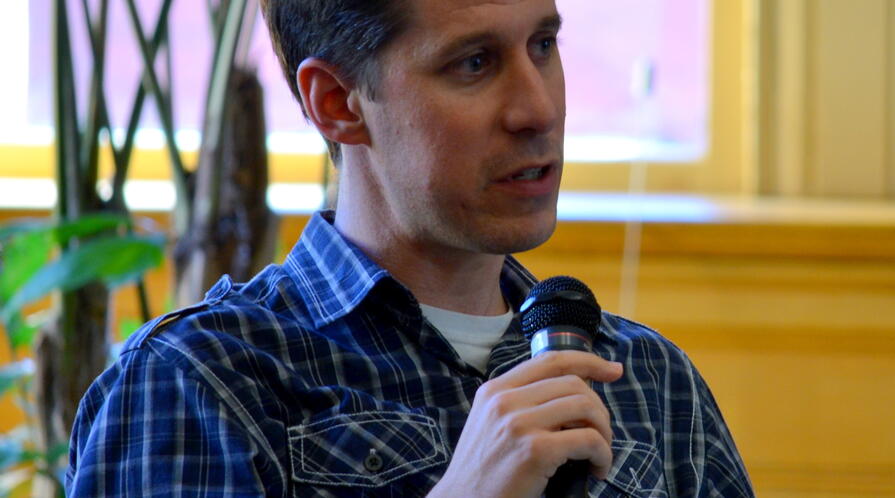CISAC Administrative Manager Homidi’s long road to Stanford
Ahmad Homidi's unassuming manner belies the turmoil he lived through as a child. He and his family fled the Soviet invasion of Afghanistan, forcing his parents to start from scratch as refugees in the United States. He joined CISAC in 2011 as the administrative manager, after navigating the 2007 housing crash as the broker of a real estate firm.
His story is a study in fresh starts.
Homidi was a child in Afghanistan when the Soviet Union invaded his homeland. His parents were faced with a hard choice: His father could join the military and fight the invasion or the family could leave the country. Or his parents – already refugees from their native Uzbekistan – could once again look for a better life in another country.
"Fleeing the country meant you couldn't just walk into a bank and empty out your account," said Homidi. "It meant carrying whatever you could, physically, and leaving that night. Whatever mattress money my father had saved up, he took with him."
Homidi, at the time 4 years old, along with his parents, older brother and little sister, hid in military vehicles and tractors. Their father bribed officials to smuggle them across the border into Pakistan. Once there, they faced discrimination for their refugee status and his father had trouble finding work. After a year living in a Karachi apartment shared by several families, Homidi's father put out a lifeline to an old colleague in the United States.
"Fleeing the country meant you couldn't just walk into a bank and empty out your account. It meant carrying whatever you could, physically, and leaving that night."
His father remembered a professor with whom he had worked at a university in Beirut.
"With his funds depleted, he just wrote a letter addressed to 'Dr. Jerry Nielsen, Montana,’ and he put a stamp on it and he hoped and prayed that it actually reached him at Montana State University," Homidi said. "Lo and behold, it did.”
Dr. Nielsen sponsored the Homidi family for entry into the United States in 1982. They lived in Montana for several months before moving to the Bay Area, where a large Afghan expat community helped the Homidis get settled in Fremont. Homidi's father soon realized his foreign master's degree in agriculture and his former life as a professor and executive didn’t go far in America.
"At that point, he had the option to say, 'Things aren't going to work out here. We'll just have a meager existence,' or he could say, 'I have to rebuild myself,'" Homidi said of his father. "He chose to rebuild himself."
Homidi's father worked three jobs while putting himself through school, and successfully pulled his family into the American middle class. Homidi credits his own strong work ethic to his father's unwavering determination to earn his way in America.
Homidi's father had the option to say, "'Things aren't going to work out here. We'll just have a meager existence.' He chose to rebuild himself."
Homidi had ambition and wanted a fulfilling job in a competitive environment. This led him to his first career in real estate.
"The allure of working on commission was something I thought made sense: the harder you work and the smarter you work, the more money you can make,” he said. “So in 1999 I got into real estate while supporting myself through college."
After graduating from San Jose State University with a business degree, Homidi joined another real estate firm as office manager. Over the next five years, he helped grow the company from one Bay Area office with 45 agents to six offices across California with more than 200 agents. He rose within the company and, when the firm was sold, took over one office as head broker.
Homidi was leading that firm when the housing market collapsed in 2007. In 2010, when he found that most of his new business was from the very banks foreclosing on homes, he knew it was time to get out. He decided to scale back the firm when he saw his employees struggling to sell houses, and did his best to help them find other jobs.
"I saw myself as helping families achieve their dreams of homeownership and prosperity. That was one of the main rewards of the business," he said of the pre-crash years. "Never did I imagine I would one day be kicking people out of their homes. I knew right then and there that this was no longer what I wanted to do."
With his interest in international affairs, sparked by his family background, he jumped at the opportunity to join CISAC in 2011 as a fixed-term staffer.
"I'm struck by what we do, and the scale that we do it at," he said. "I am very fortunate to work in such an amazing environment, to be around the people that we're working with and collaborating with in different ways, it's pretty amazing."







